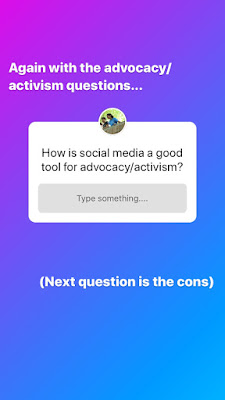Social media activism, according to my friends on Instagram
I wanted to write something about the pros and cons of using social media to engage in the political process. Not least because our very own President of the United States was banned from Twitter following an attempted coup he (and others) incited, an insurrection fueled by propaganda and misinformation that algorithms designed to maximize profit amplified.
The thing is, I've only had Instagram since, like, March 2020. Not even a year. Even if I were the most active influencer on the planet, I still couldn't present myself as having any credibility on the topic because my experience on social media is shaped by my age, gender, race, class background, school culture, political beliefs, and more.
So, I called for backup and put it up on my Instagram story.
Among the "pros" of social media:
“It makes action/resources more accessible”
- True! You don't have to go through a lot of other websites or attend webinars to find out what your options are for action items.
“Spreads action items quickly like protest flyers, mutual aid, numbers to call, etc”
- I wouldn't have even known what mutual aid is and why it matters if not for social media!
“You can give your full word without being interrupted"
- I like this answer because it's a great point that you don't have to schedule a time to raise your voice! Meetings with members of Congress have to be scheduled, phone calls depend on someone picking up, and letters to the editor can be hard to get published in newspapers. It sucks when people can spew hate uninterrupted on social media, but I tend to forget that it's beautiful how people can start to find their voice in places like social media accounts.
“Meet people from all over the country and world!”
- This is so true, and the person who gave me this answer is one of those people I'm really lucky to have met at Sunrise School's Defund the Police crash course over the summer and kept in touch with over Instagram.
“Outreach, people comment, send to their friends and discuss”
- Not sure how often people actually engage this much with social media content compared to hours of mindless scrolling, but it's true that I've had some meaningful conversations this year based on social media posts (including the time I wrote a post about my experiences with antisemitism and several non-Jews reached out to me, as I said I was comfortable with that, because they wanted to better understand and support my community).



“Easier to contact other organizers & participants on both a local, national, and global level.”
“Literally make one graphic for an event and bam, 100s of people show up lmao. Also just a good way to keep passive supporters in the loop, as well as pushing them father”.
“It has arguably the widest reach of any possible platform."
“It almost forces people to care about, or at least take notice of, what’s happening around them”
“It can help bring awareness, organizers have used social media for years to plan protests/events/fundraisers.”
“It can become performative.”
- This was the hands-down most common answer, and they're absolutely right. People post black squares or put their pronouns in their bio for personal benefit, rather than a commitment to actually helping, or repost activist-y content without understanding what's going on. It's so easy to fall into this trap on social media (I've done it myself, and I'm trying to do better). Pretending to be an activist or an ally when you don't live up to it causes harm.
- How to avoid performative activism? Do something concrete before and after posting about it, whether it's reading more about the topic to educate yourself, discussing with a friend or family member, making a donation, or contacting a decision-maker.
“People think they’re helping a ton when it’s not that much, misinformation spreads easily."
“People think their voice is just as important as everyone else’s.”
- I followed up with the person who wrote this to clarify that we mean when people speak over marginalized groups instead of listening and amplifying their voices, and presenting themselves as experts when they don't really know what they're talking about.
“A lot of people stop the activism at social media and don’t do further research.”
“Lots of pointless negative feedback noise and further polarization”
“Half-baked understandings of history/theory”
- One of the ways in which it becomes obvious that people want to repost what they think sounds nice, instead of a deeper dive into what it means to tackle injustice, is unwillingness to even Google the history and meaning of capitalism, communism, imperialism, socialism, etc. I see these terms thrown around all the time, often incorrectly, or people completely avoid it because it feels taboo to talk about in America. But that leads to a very limited discussion about how we can make the systems we currently have nicer, rather than considering what it would mean to abolish/rebuild.
- Many thanks to the folks who beautifully put this into words and gave me permission to summarize it here.
“Also I just hate it thanks”
- Fair enough.
“Sometimes context and personal connection to issues can get lost in translation”
“Once people start seeing the same stuff everywhere (like certain posts being reposted over and over again) they start tuning it out, which is not good.”
“Fake news doesn’t get reported and even if it does, some have already seen it or have been affected by it and might’ve changed their view on the topic. For example, the misunderstood tax-raise policy of Biden, for those earning over $400,000.”
“We tend to live in a bubble online which makes it harder to reach out.”
I also want to add something I didn't really see in the replies: social media is incredibly draining, mentally and emotionally!







Comments
Post a Comment